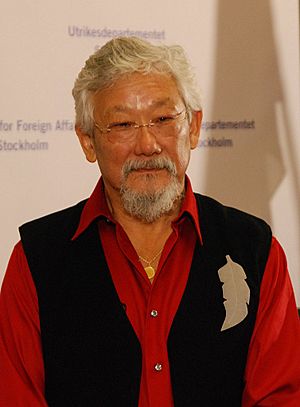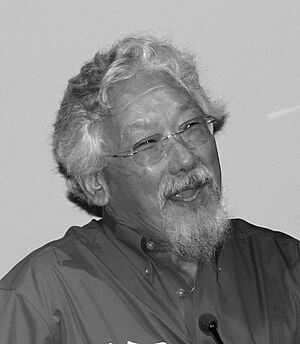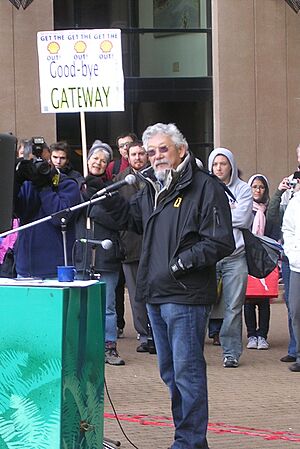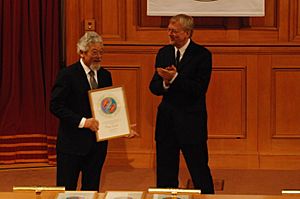David Suzuki facts for kids
Quick facts for kids
David Suzuki
CC OBC FRSC
|
|
|---|---|

Suzuki in December 2009
|
|
| Born |
David Takayoshi Suzuki
March 24, 1936 Vancouver, British Columbia, Canada
|
| Education | Amherst College (BA) University of Chicago (PhD) |
| Children | 5 |
| Awards |
|
| Scientific career | |
| Institutions | University of British Columbia |
| Thesis | Interchromosomal effects on crossing over in Drosophila melanogaster (1961) |
| Doctoral advisor | Bill Baker |
| Other academic advisors |
|
| Signature | |
David Takayoshi Suzuki (born March 24, 1936) is a Canadian scientist, television host, and environmental activist. He earned his PhD in zoology from the University of Chicago in 1961. He was a professor at the University of British Columbia from 1963 until he retired in 2001.
Since the mid-1970s, Suzuki has been famous for his TV shows, radio programs, documentaries, and books. These works are all about nature and the environment. He is best known for hosting The Nature of Things, a science show on CBC Television. This show has been seen in over 40 countries. He is also known for speaking out when governments do not protect the environment.
Suzuki has worked for a long time to help stop climate change. In 1990, he helped start the David Suzuki Foundation. This group works to help people live in a way that respects nature. The Foundation focuses on oceans and sustainable fishing, climate change and clean energy, and sustainability. They also work to protect oceans from big oil spills.
In 2009, Suzuki received the Right Livelihood Award. His 2011 book The Legacy won an award too. He is a Companion of the Order of Canada, which is a high honour. In 2004, he was voted fifth on a list of "The Greatest Canadian" of all time.
Contents
David Suzuki's Early Life
Suzuki was born in 1936 in Vancouver, British Columbia. He has a twin sister, Marcia, and two other sisters, Geraldine and Dawn. His parents were also born in Canada. His grandparents came to Canada from Japan in the early 1900s.
During the Second World War, Suzuki's family, like many other Japanese Canadian families, faced a difficult time. In 1942, the government forced them to move to special camps. Suzuki, his mother, and two sisters were sent to a camp in Slocan. His father was sent to a labour camp earlier. His youngest sister, Dawn, was born in the internment camp.
After the war, his family had to move east of the Rocky Mountains. They lived in different towns in Ontario. Suzuki has often said that his father taught him to love and care for nature. He went to school in Leamington and London.
David Suzuki's Academic Career
Suzuki studied biology at Amherst College in Massachusetts. He earned his Bachelor of Arts degree in 1958. There, he became very interested in genetics. In 1961, he received his PhD in zoology from the University of Chicago.
He worked at Oak Ridge National Laboratory for a year. Then, he was a professor at the University of Alberta. From 1963 until he retired in 2001, he was a professor in the genetics department at the University of British Columbia. He is now a professor emeritus there.
Early in his career, he studied genetics using Drosophila melanogaster, which are fruit flies. He looked for new genes that were sensitive to temperature.
David Suzuki's Broadcasting Career
Suzuki started on television on January 10, 1971. His first show was a children's program called Suzuki on Science. In 1974, he started the radio show Quirks & Quarks. He hosted it from 1975 to 1979. In the 1970s, he also hosted Science Magazine for adults.
From 1979 to 2023, Suzuki hosted The Nature of Things. This CBC television series has been shown in almost 50 countries. On the show, Suzuki wanted to make people interested in nature. He also showed threats to people and wildlife. He suggested ways for humans to live in a more sustainable way. He has strongly supported renewable energy.
Suzuki also hosted The Secret of Life on PBS in 1993. His 1985 series A Planet for the Taking was very popular. It won him a United Nations Environment Programme Medal. In this series, he said that people often think nature is endless. He called for a big change in how we see our relationship with nature.
His book The Sacred Balance was first published in 1997. It was later made into a five-hour TV show in 2002. Suzuki has also appeared in ads to promote energy conservation. These ads encourage using things like compact fluorescent lightbulbs.
For the Discovery Channel, Suzuki produced "Yellowstone to Yukon: The Wildlands Project" in 1997. This documentary was about protecting large areas of wilderness. It looked at how to connect wild spaces to help keep different kinds of plants and animals safe.
In October 2022, Suzuki announced he would retire from The Nature of Things in spring 2023.
David Suzuki's Climate Change Activism
Suzuki strongly believes that climate change is a very serious problem. He says that most scientists agree that human actions are causing it. The David Suzuki Foundation website states that there is "irrefutable evidence" of climate change. This evidence includes extreme weather, record temperatures, and rising sea levels.
The Foundation explains that the Intergovernmental Panel on Climate Change (IPCC) agrees that human activity is causing warming. The IPCC is a large group of scientists from over 130 countries. Many science academies around the world support their findings.
Suzuki has said that some people tried to confuse the public about climate science. He believes a small number of critics, often not climate scientists, tried to delay action on climate change. He says these groups received money from oil and coal companies.
Suzuki is an ambassador for 350.org, an environmental group. This group works to reduce CO2 emissions and find climate solutions. Suzuki has also supported making "ecocide" a crime. He says harming the environment is a crime against life and harms humans too.
Suzuki has faced some criticism because he travels a lot for his work. He has said that his travel means he uses more carbon than he would like. He now tries to group his speaking events to reduce his carbon footprint. He also prefers to appear by video conference.
In 2021, he made a comment about pipelines that he later apologized for. In July 2025, Suzuki said that it was "too late" to solve the climate crisis. He explained that humanity had crossed several "planetary boundaries." These are limits on how we live on Earth. He added that people should prepare for more severe natural disasters.
David Suzuki's Personal Life
Suzuki was married to Setsuko Joane Sunahara from 1958 to 1965. They had three children. In 1973, Suzuki married Tara Elizabeth Cullis. They have two daughters, Severn Cullis-Suzuki and Sarika Cullis-Suzuki. As of 2022, he has ten grandchildren. His grandchildren include snowboarder and filmmaker Tamo Campos. His cousins' grandchildren are Montreal Canadiens captain Nick Suzuki and Carolina Hurricanes player Ryan Suzuki.
Suzuki is an atheist. He has been criticized for owning multiple homes, even though he talks about living simply.
Awards and Honours for David Suzuki
- Suzuki has received many honours. He was made an Officer of the Order of Canada in 1976 and a Companion in 2006.
- He also received the Order of British Columbia in 1995.
- In 1986, he won UNESCO's Kalinga Prize for making science popular.
- He received the Queen Elizabeth II Silver Jubilee Medal in 1977.
- He received the 125th Anniversary of the Confederation of Canada Medal in 1992.
- He received the Queen Elizabeth II Golden Jubilee Medal in 2002.
- He received the Queen Elizabeth II Diamond Jubilee Medal in 2012.
- In 2004, he was voted fifth in a CBC poll for "The Greatest Canadian". This made him the greatest living Canadian at the time. Suzuki said he voted for Tommy Douglas.
- In 2006, he received the Bradford Washburn Award in Boston.
- In 2007, he was honoured by Global Exchange with the International Human Rights Award.
- In 2009, he received the Right Livelihood Award.
- A 2010 documentary film about him was called Force of Nature: The David Suzuki Movie.
- On June 23, 2015, the Vancouver City Council gave him the Freedom of the City.
Honorary Degrees
Suzuki has received many honorary degrees from universities. These are special degrees given to people who have achieved great things.
| Location | Date | School | Degree |
|---|---|---|---|
| 1974 | University of Prince Edward Island | Doctor of Laws (LL.D) | |
| June 1979 | University of Windsor | Doctor of Science (D.Sc) | |
| 1979 | Acadia University | Doctor of Science (D.Sc) | |
| Fall 1981 | Trent University | Doctor of Laws (LL.D) | |
| 1986 | University of Calgary | Doctor of Laws (LL.D) | |
| 1986 | Governors State University | Doctor of Humane Letters (DHL) | |
| 1986 | Lakehead University | Doctor of Science (D.Sc) | |
| June 1987 | McMaster University | Doctor of Science (D.Sc) | |
| 1987 | Queen's University | Doctor of Laws (LL.D) | |
| 1987 | Carleton University | Doctor of Science (D.Sc) | |
| 1989 | Amherst College | Doctor of Science (D.Sc) | |
| 16 April 1997 | Griffith University | Doctor of the University (D.Univ) | |
| 1999 | Whitman College | Doctor of Science (D.Sc) | |
| 2000 | Unity College | Doctor of Environmental Science | |
| 2000 | Simon Fraser University | Doctor of Laws (LL.D) | |
| Spring 2005 | York University | Doctor of Science (D.Sc) | |
| 2005 | Université du Québec à Montréal | Doctor of Science (D.Sc) | |
| 2005 | Flinders University | Doctor of Science (D.Sc) | |
| 2007 | Ryerson University | Doctor of Communications | |
| 2007 | Université de Montréal | Doctor of Science (D.Sc) | |
| 10 August 2007 | University of Western Ontario | Doctor of Science (D.Sc) | |
| 2008 | Lambton College | Diploma in Alternative Energy Engineering Technology | |
| May 2009 | Memorial University of Newfoundland | Doctor of Science (D.Sc) | |
| 2010 | Université Sainte-Anne | Doctorate | |
| 2011 | Université Laval | Doctor of Communications | |
| 25 November 2011 | University of British Columbia | Doctor of Science (D.Sc) | |
| June 2012 | University of Guelph | Doctor of Laws (LL.D) | |
| 2015 | University of Winnipeg | Doctor of Science (D.Sc) | |
| 7 June 2018 | University of Alberta | Doctor of Science (D.Sc.) |
See also
 In Spanish: David Suzuki para niños
In Spanish: David Suzuki para niños
 | Aurelia Browder |
 | Nannie Helen Burroughs |
 | Michelle Alexander |




